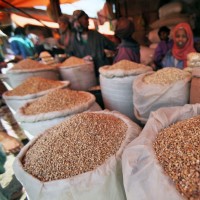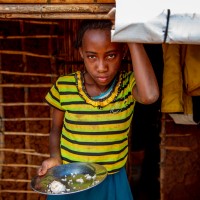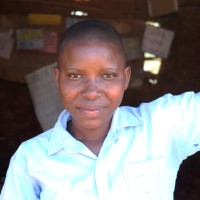While the conflict in Ukraine is dominating news cycles, there is another global crisis unfolding that the world isn’t talking about: the greatest hunger crisis of the century.
811 million people are hungry right now.
Conflict, climate shocks and COVID-19 are contributing to a dramatic escalation in food insecurity. If all the hungry people in the world formed an imaginary country, this country would be the third largest on the planet.
Worldwide, one in eight people, many of them children, will go hungry tonight. Teenagers and children under five are particularly vulnerable to malnutrition. Adolescent girls are at risk of early and forced marriage or early pregnancy, as well as sexual violence, exploitation and being made to leave school.
“If life-saving humanitarian assistance is not urgently stepped up, 300,000 people could starve to death every single day. ”
But, if we act now, we can help save lives. Millions of children, and especially girls, are in urgent need of food.
Will You Help?
- €25 is enough to provide 9 households in Ethiopia with water for three months.
- €200 is the cost of one water truck for a community.
- €33 could provide 2 children in our programs in Kenya with school meals for two months, guaranteeing them a regular meal.
- €80 is enough to provide a family in Ethiopia with a cash transfer so they can purchase food to last them a month.
The Time to Act is Now
How is Plan International Responding?
Our staff are already working with communities bearing the brunt of this global food crisis to reach those most affected and expand our support. That means more food distributions, school meals, cash and voucher assistance, malnutrition screenings and nutrition support. Here are some recent examples of our response so far:
- In Kenya, we’re working across a number of counties to provide a daily school meal to over 4,500 children.
- In Somalia, over 18,000 people in 2,000 households are accessing clean and safe drinking water.
- In Niger, hundreds of families have received cash transfers so they can decide the best way to cover their most basic needs. The most common purchases are maize, rice and school snacks for children.
- In Burkina Faso, children in displacement camps are finding a safe refuge in our child-friendly spaces, where children can came to play, relax and make friends in their new environments.
- In Mali, women are growing a sustainable supply of nutritious food through our community garden project. They receive training, technical support and seeds to help them produce tomatoes, salad and potatoes.
- In Ethiopia, families can sign up to receive animal feeding supplements to keep their livestock healthy.
No Child Should Ever Be Hungry


